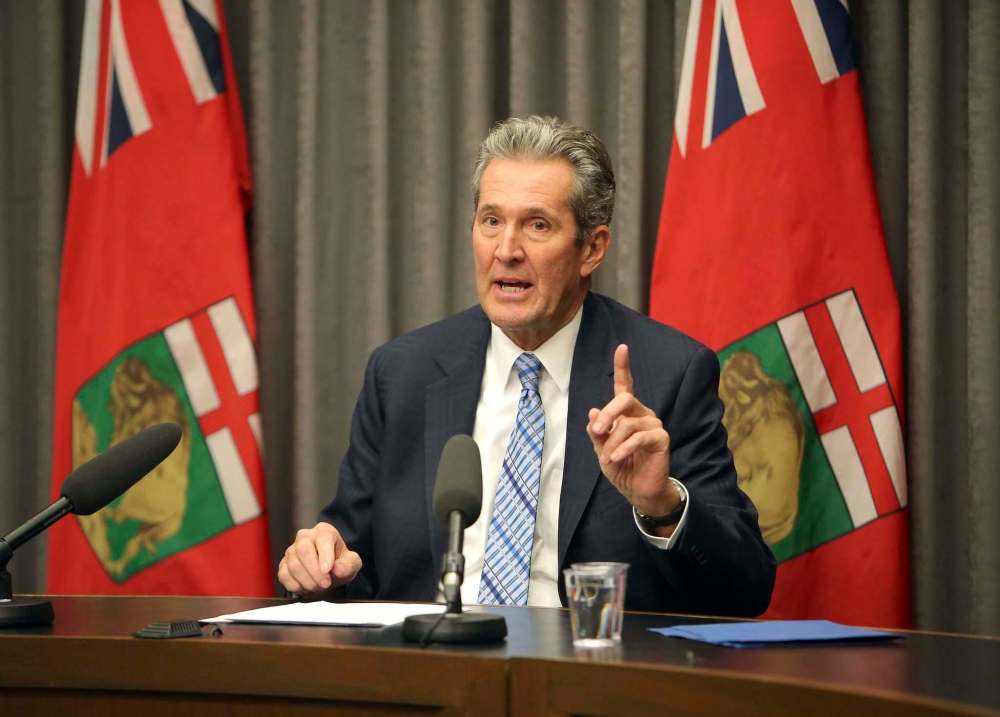Carbon tax vulnerable to legal challenge
Advertisement
Read this article for free:
or
Already have an account? Log in here »
To continue reading, please subscribe:
Monthly Digital Subscription
$1 per week for 24 weeks*
- Enjoy unlimited reading on winnipegfreepress.com
- Read the E-Edition, our digital replica newspaper
- Access News Break, our award-winning app
- Play interactive puzzles
*Billed as $4.00 plus GST every four weeks. After 24 weeks, price increases to the regular rate of $19.95 plus GST every four weeks. Offer available to new and qualified returning subscribers only. Cancel any time.
Monthly Digital Subscription
$4.99/week*
- Enjoy unlimited reading on winnipegfreepress.com
- Read the E-Edition, our digital replica newspaper
- Access News Break, our award-winning app
- Play interactive puzzles
*Billed as $19.95 plus GST every four weeks. Cancel any time.
To continue reading, please subscribe:
Add Free Press access to your Brandon Sun subscription for only an additional
$1 for the first 4 weeks*
*Your next subscription payment will increase by $1.00 and you will be charged $16.99 plus GST for four weeks. After four weeks, your payment will increase to $23.99 plus GST every four weeks.
Read unlimited articles for free today:
or
Already have an account? Log in here »
Hey there, time traveller!
This article was published 06/04/2019 (2507 days ago), so information in it may no longer be current.
Here’s the most important reason Premier Brian Pallister is right to challenge the federal carbon tax in court: he could win.
The challenge comes at a poignant moment. This month, Manitobans began paying the federal carbon tax that adds 4.4 cents per litre to the price of gasoline and 6.4 cents per litre to diesel.
Even before that price spike, the carbon tax has been unpopular in Manitoba.

Ottawa’s carbon tax isn’t just unpopular — it’s facing challenges across Canada. New Brunswick, Ontario and Saskatchewan are also going to court. Depending on the outcome of this month’s Alberta election, that province may follow.
Even amid the uncertainty of a courtroom proceeding, the provinces’ prospects are good.
First, there’s Manitoba’s legal analysis. Law professor Brian Schwartz provided an independent opinion suggesting the province could challenge the federal carbon tax by demonstrating its own environmental policies are effective.
Pallister specifically cited this option when he announced his court challenge.
The Canadian Taxpayers Federation intervened in the Saskatchewan carbon tax challenge on Feb. 13, and is also intervening in the Ontario carbon tax challenge on April 15 and consulting with lawyers regarding the possibility of intervening in the New Brunswick and Manitoba challenges.
Here are our legal arguments:
First, carbon taxes don’t help the environment. This argument might seem unusual, since, legally speaking, the question is whether Ottawa can impose its carbon tax, not whether it works.
However, federal lawyers are leaning on the track record of British Columbia’s carbon tax in their arguments. One piece of B.C.’s experience really matters here: despite a decade of paying a carbon tax, B.C.’s emissions have gone up in five of the past six years. There’s more than a reasonable doubt that carbon taxes decrease emissions
Second, we argue a carbon tax is a tax. That may seem obvious, but federal lawyers like to call the carbon tax a carbon levy, fee or, the latest federal invention, “a price on pollution” — anything but a tax.
Here’s the problem: the carbon tax does not meet the definition of a fee or levy as outlined in the case Westbank First Nation v. British Columbia Hydro and Power Authority.
Fees and levies are specific charges subject to specific regulations to address specific costs. Ottawa’s carbon tax simply flows into the treasury — rebates or any other uses of the money are not directly or legally related to the carbon tax.
In short, if it looks like a tax and it quacks like a tax, it’s a tax.
Third, Ottawa’s carbon tax legislation runs afoul of a fundamental democratic principle: no taxation without representation. The Greenhouse Gas Pollution Pricing Act doesn’t specify who should pay the tax, what it applies to, where it should be applied or how high the tax should be set.
All of those basic elements are relegated to regulation and delegated to the prime minister and cabinet.
In other words, the prime minister can raise and expand the carbon tax without a vote in Parliament.
That’s unconstitutional. Only Parliament has the right to impose a tax, and elected officials must take responsibility for taxes by voting.
Ottawa’s carbon tax entirely evades this basic element of responsible government by calling the carbon tax a fee or levy. It’s as if Ottawa believes the American Revolution could have been avoided if only the Tea Act had imposed a tea fee instead of a tea tax.
Pallister is right to represent the will of Manitobans by challenging the federal carbon tax.
It’s unfair for Ottawa to force Manitobans to pay a carbon tax that won’t work. But Pallister is also right because Manitoba has a strong legal case to strike down the carbon tax in the courts.
Todd MacKay is Prairie director of the Canadian Taxpayers Federation.


